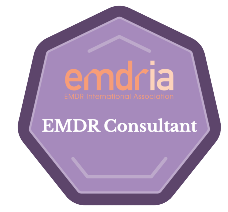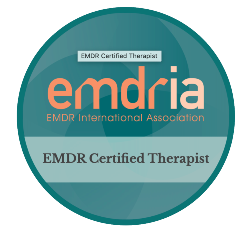Be your best self.
EMDR Therapy
EMDR stands for Eye Movement Desensitization and Reprocessing. It is a well-researched and established therapy that combines imagery, mindfulness, and cognitive techniques to meet the client’s treatment needs. EMDR therapy is often used in trauma counseling and in the treatment of anxiety.
EMDR therapy is a cornerstone of our practice at Greenwood Counseling Center.
The process:
The process of doing EMDR therapy usually involves focus on a traumatic or disturbing memory while doing back and forth eye movements, listening to alternating tones, and/or feeling alternating vibrations in your hands. This process enables the brain to resolve emotional trauma and gain insight into the circumstance in a way that is often more effective than traditional talk therapy.
How long does EMDR therapy take?
The number of sessions required for this form of treatment varies depending on the issues being addressed.
If there is a single traumatic incident that is the subject of the Eye Movement Desensitization and Reprocessing, then it can typically be resolved in five or six sessions, including the intake and preparation. However, for multiple traumas or a long history of past abuse, trauma or neglect, this type of therapy can take considerably longer for resolution of the issues.
The amazing thing about EMDR treatment is that the resolution tends to be more thorough and long standing than other forms of therapy as we can address the root of the problem, any current triggers associated with the problem and we also may work on future scenarios that may be creating anticipatory anxiety.
Who is a good candidate for EMDR therapy?
Eye Movement Desensitization and Reprocessing Therapy is used with children, teens and adults for Post Traumatic Stress Disorder (PTSD) treatment, depression treatment, anxiety counseling, grief counseling, dependence counseling, work through painful emotions, and so much more.
Understanding EMDR Therapy:
Click here to learn more about how EMDR therapy works
How many sessions for EMDR therapy?
There are many myths about EMDR therapy, and the duration of treatment is often one of those misunderstandings. The length of time to go through the eight phases of EMDR varies. In rare cases, you could potentially get through the eight phases from start to finish in just a few sessions for one target.
It is advisable to spend time initially in the therapy making sure you feel comfortable with your therapist and making sure they understand your history and goals for treatment.
For each target it can vary for the length of time processing. Sometimes it takes several sessions to process a target and sometimes it only takes one session before we can move on to the next target.
Your therapist will be teaching you coping skills during the early phases of treatment. If you practice your coping skills in between sessions, it will increase your ability to process through the targets most effectively, expediting the treatment.
Do we do EMDR without talking?
EMDR does involve some talk therapy. The time spent listening to your history and getting to know you is very important. Even after we have begun the processing of memories, some clients like to have two or three sessions that are focused on EMDR therapy and then spend a session just wanting to talk, without the physical sensations. You are encouraged to work with your therapist to determine the pace that is most comfortable for you. Your EMDR/trauma therapist will be trained to help unpack traumatic events & negative beliefs
In addition, Your therapist will check in with you every minute or so and there will be a brief exchange. The EMDR therapist is working to create a feeling of safety and calm so that you can have the best EMDR processing experience.
Can EMDR treat anxiety and problems other than PTSD?
EMDR was initially approved to treat trauma, however since the early days of its development it has been effectively used to treat anxiety, depression, grief, addictions, low self esteem and more.
Can EMDR make PTSD worse?
EMDR therapists are trained to screen clients to make sure they have good coping skills prior to beginning EMDR. If necessary, therapists will teach you more coping skills to help manage the symptoms of PTSD prior to beginning EMDR.
Sometimes EMDR therapy can be upsetting when you are thinking about painful memories in the processing, but your therapist is right there with you, helping you to feel safe, helping you to regulate your emotions, and helping you to reorient to your coping skills prior to leaving the session.
As the saying goes, “the only way out, is often through” the memory. Your therapist is there to help you through the tough stuff and to help you strengthen the insights you have gained.
Can EMDR cause memory loss?
EMDR won’t cause memory loss, but the memory will not hold the same negative charge that it used to hold for you prior to the successful processing. You will have more adaptive emotions around the memory and it will no longer trigger unpleasant feelings or unwanted behaviors and reactions.
Related Posts
- What Is Trauma-Informed Care?It is shocking how widespread trauma is, and how devastating its generational impacts can be. Trauma is subjective—some people have a greater capacity for stress than others—and can come in many forms.
- How Does Online Therapy Work?In such a short amount of time so much has changed in our world. As a result, we are all having to explore new ways of doing things. Therapy is no different. Although online therapy…
- Posttraumatic Growth: From Surviving to ThrivingThe pursuit of happiness and thriving is deep-seated in each of us, yet can feel unattainable for some who are struggling to recover from trauma or complex trauma. There are inspiring stories of triumph and…
Call (303) 221-1272 for a 15 minute free initial phone consultation. You may also email us to schedule a time to talk over the phone. We are happy to answer any questions you may have so that you can feel confident starting your path to healing.







